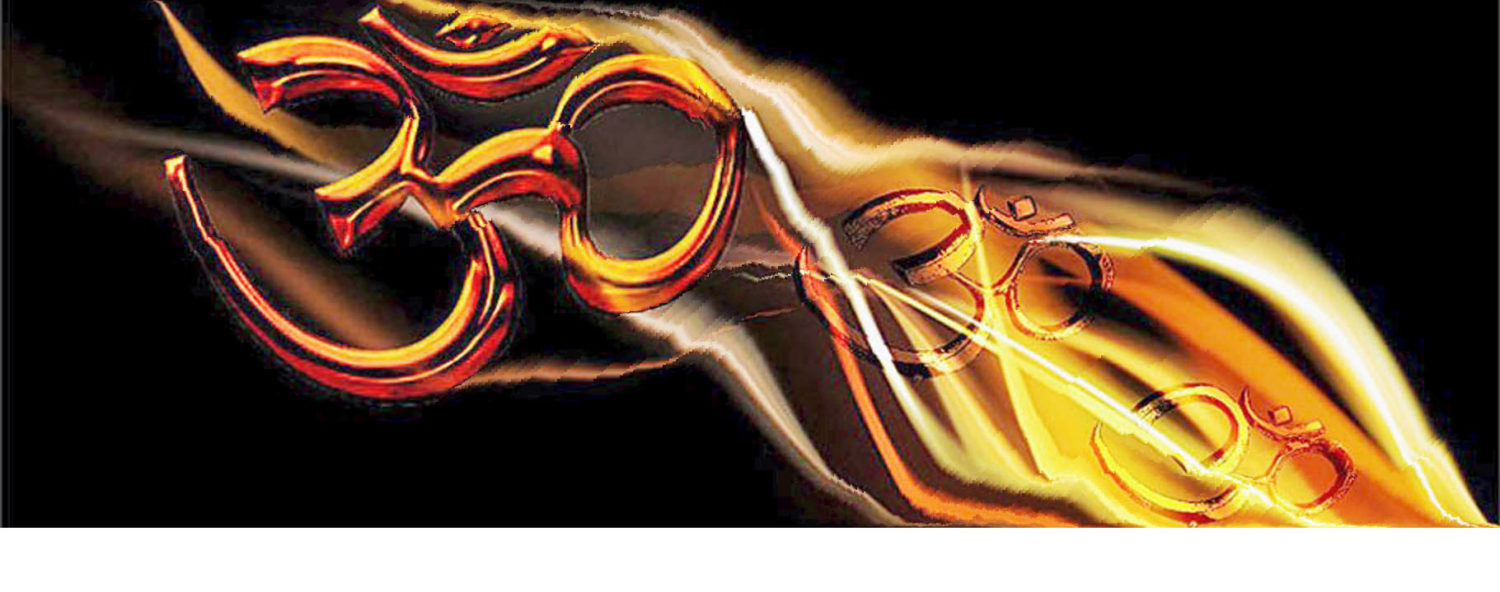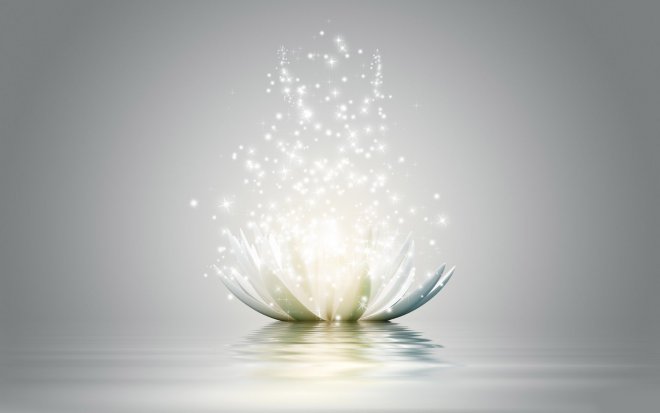Pathway to God – God – Gandhi
Pathway to God
Part 1 : Intellectual Sadhana
CHAPTER ONE
GOD
Om
The Supreme Ideal
Man’s Ultimate Aim is Realization of God.
God
is Sat-Chit-Ananda Existence, Knowledge, Power and Bliss.
He is an Omnipresent, Omniscient, Omnipotent, Omniblissful Mysterious Power.
Our Soul
is A Spark of Divine Fire, A Drop in the Divine Ocean.
The World
is Full of Joy and Misery— Joy with God and Misery without Him.
Man’s Duty
is to realize God, serve Humanity, and Enjoy His Eternal Bliss.
GOD
(1) GOD IS ONE, WITHOUT A SECOND
God is certainly One. He has no second. He is unfathomable, unknowable and unknown to the vast majority of mankind. He is everywhere. He sees without eyes and hears without ears. He is formless and indivisible. He is uncreate, has no father, mother or child; and yet He allows Himself to be worshipped as father, mother, wife and child. He allows Himself even to be worshipped as stock and stone, although He is none of these things. He is the most elusive. He is the nearest to us, if we would but know the fact. But He is farthest from us when we do not want to realize His omnipresence.
I dispute the description that Hindus believe in many Gods and are idolaters. They do say that there are many gods, but they also declare unmistakably that there is one God, the God of gods. It is, not therefore, proper to suggest that Hindus believe in many gods. They certainly believe in many worlds. Just as there is a world inhabited by men and another by beast, so also, is there one inhabited by superior beings called gods, whom we do not see but who nevertheless exist.
The whole mischief is created by the English rendering of the word देव or देवता (deva or devata) for which you have not found a better term than “god”. But God is Ishwara, Devadhideva, God of gods. So you see it is the word “God” used to describe different divine beings that has given rise to such confusion. I believe that I am a thorough Hindu but I never believe in many gods. Never even in my childhood did I hold that belief and no one ever taught me to do so.
(2) HE IS OMNIPRESENT, OMNISCIENT AND OMNIPOTENT
God is not some person outside ourselves or away from the universe. He pervades everything and is omniscient as well as omnipotent. He does not need any praise or petitions. Being immanent in all beings, He hears everything and reads our innermost thoughts. He abides in our hearts and is nearer to us than the nails on our fingers.
God is then not a person. He is the all-pervading, all-powerful Spirit. Any one who hears Him in his heart has accession of a marvellous force or energy, comparable in its results to physical forces like steam or electricity but much more subtle.
(3) HE IS A MYSTERIOUS POWER
There is an indefinable Mysterious Power that pervades everything. I feel it though I don’t see it. It is this Unseen Power which makes itself felt and yet defies all proof, because it is so unlike all that I perceive through my senses. It transcends the senses.
I do dimly perceive that whilst everything around me is ever changing and ever dying, there is underlying all that change a Living Power that is changeless, that holds all together, that creates, dissolves and recreates. This informing Power or Spirit is God.
The truth is that God is the Force. He is the essence of life. He is pure, undefiled consciousness. He is eternal. And yet, strangely enough, all are not able to derive, either benefit from or shelter in the all-pervading Living Presence.
Electricity is a powerful force. Not all can benefit from it. It can only be produced by following certain laws. It is a lifeless force. Man can utilize it if he can labour hard enough to acquire the knowledge of its laws. The Living Force which we call God can similarly be followed if we know and follow His law leading to the discovery of Him in us.
God is an Unseen Power residing within us. There are many powers lying hidden within us and we discover them by constant struggle. Even so, we may find this Supreme Power, if we make deligent search with the fixed determination to find Him.
My God does not reside above. He has to be realized on earth. He is here, within you, within me. He is omnipotent and omnipresent. You need not think of the world beyond. If we can do our duty here, the beyond will take care of itself.
(4) THE SUPREME GOOD
Is this Power benevolent or malevolent? I see It as purely benevolent. For I can see that in the midst of death, life persists; in the midst of untruth, truth persists; in the midst of darkness, light persists. Hence, I gather that God is Life, Truth, Light. He is Love. He is the Supreme Good.
God is wholly good. There is no evil in Him. God made man in His own image. Unfortunately for us, man has fashioned Him in his own. This arrogation has landed mankind in a sea of troubles. God is the Supreme Alchemist. In His presence all iron and dross turn into pure gold. Similarly does all evil turn into good.
Again God lives, but not as we. His creatures live but to die. But God is Life. Therefore, goodness and all it connotes is not an attribute. Goodness is God. Goodness conceived as apart from Him, is a lifeless thing and exists while it is a paying policy. So are all morals. If they are to live in us, they must be considered and cultivated in their relation to God. We try to become good, because we want to reach and realize God. All the dry ethics of the world turns to dust because apart from God they are lifeless. Coming from God they come with life in them. They become part of us and ennoble us.
(5) GOD IS TRUTH AND LOVE
The Absolute Truth, the Eternal Principle, that is God. There are innumerable definitions of God, because His manifestations are innumerable. They overwhelm me with wonder and awe and for a moment stun me. But I worship God as Truth only.
To me God is Truth and Love. God is ethics and morality; God is fearlessness. God is the source of Light and Life, and yet He is above and beyond all these.
God is conscience. He is even the atheism of the atheist. For in His boundless love, God permits the atheist to live. He is the searcher of the hearts. He knows us and our hearts better than we do ourselves. … He is personal God to those who need His personal presence. He is embodied to those who need His touch. He is the purest Essence. He is, to those who have faith. He is all things to all men.
(6) GOD IS SAT-CHIT-ANANDA
The word Satya (Truth) is derived from Sat which means “Being”. And nothing is or exists in reality except Truth. That is why Sat or Truth is perhaps the most important name of God. In fact, it is more correct to say Truth is God than to say God is Truth.
And where there is Truth, there is also Knowledge, which is true. Where there is no Truth, there can be no true knowledge. That is why the word Chit or Knowledge is associated with the name of God. And where there is true Knowledge, there is always Bliss (Ananda). Sorrow has no place there. And even as Truth is Eternal, so is the Bliss derived from it. Hence we know God as Sat- Chit-Ananda, one who combines in Himself, Truth, Knowledge and Bliss.
(7) HE Is LAW ETERNAL
God is an Idea, Law Himself. … He and His Law abide everywhere and govern everything. Therefore, though I do not think that He answers in every detail, every request of ours, there is no doubt that He rules our actions and I literally believe that not a blade of grass grows or moves without His will.
I do feel that there is orderliness in the universe, there is an unalterable Law governing everything and every being that lives and moves. It is not a blind law, for no blind law can govern the conduct of living beings. . . . The Law and the Law-giver are one. I may not deny the Law or Law-giver, because I know so little about It or Him. Even as my denial or ignorance of the existence of an earthly power will avail nothing, so will not my denial of God and His Law, liberate me from its operation; whereas, humble and mute acceptance of Divine Authority makes life’s journey easier even as acceptance of earthly rule makes life under it easier.
(8) HIS INFINITE MERCY
God is, even though the whole world deny Him. God embraces not only this tiny globe of ours, but millions and billions of such globes. How can we, little crawling creatures so utterly helpless as He has made us, how could we possibly measure His greatness, His boundless love, His infinite compassion? So great is His infinite love and pity that He allows man insolently to deny Him, wrangle about Him, and cut the throats of his fellowmen. How can we measure the greatness of God, who is so forgiving, so divine ?
He allows us freedom and yet His compassion commands obedience to His Will. But if anyone of us disdains to bow to His Will, He says: “So be it.” “My sun will shine no less for thee, My clouds will rain no less for thee. I need not force thee to accept My sway.” Of such a God let the ignorant dispute the existence. I am one of the millions of wise men who believe in Him and am never tired of bowing to Him and singing His glory.
God is the hardest task-master, I have known on earth. He tries you through and through. And when you find your faith is failing, or your body is failing you, and you are sinking, He comes to your assistance somehow or other and proves to you that you must not lose your faith and that He is always at your beck and call, but on His terms. So I have found. I cannot recall a single instance when at the eleventh hour, He has forsaken me.
(9) HE HAS MANY NAMES
There is only one omnipotent and omnipresent God. He is named variously and we remember Him by the name which is most familiar to us. Each person can choose the name that appeals most to him. Ishwara, Allah, Khuda, God mean the same.
God has a thousand names, or rather, He is nameless. We may worship or pray to Him by whichever name that pleases us. All worship the same Spirit, but as all foods do not agree with all, all names do not appeal to all. Each chooses the name according to His associations and He being the Indweller, All-Powerful and Omniscient, knows our inmost feelings and responds to us according to our deserts.
In my opinion, Rama, Rahaman, Ahurmazda, God or Krishna, are all attempts on the part of man to name that invisible Force. . . . Man can only conceive God within the limitations of his own mind. What matters, then, whether one man worships God as a person and another as Force? Both do right according to their lights. One need only remember that God is the Force among all the forces. All other forces are material. But God is the Vital Force or Spirit which is all- pervading, all-embracing and therefore beyond human ken.
Daridranarayan is one of millions of names by which humanity knows God who is unnameable and unfathomable by human understanding. And it means God of the poor, God appearing in the hearts of the poor.
(10) HIS INCARNATIONS
God is not a person. To affirm that He descends to earth every now and again, in the form of human being, is a partial truth, which merely signifies that such a person lives near to God. Inasmuch as God is omnipresent, He dwells within every human being and all may, therefore, be said to be incarnations of Him. But this leads us nowhere. Rama, Krishna, etc. are called incarnations of God because we attribute divine qualities to them. Whether they actually lived or not does not affect the picture of them in man’s mind.












